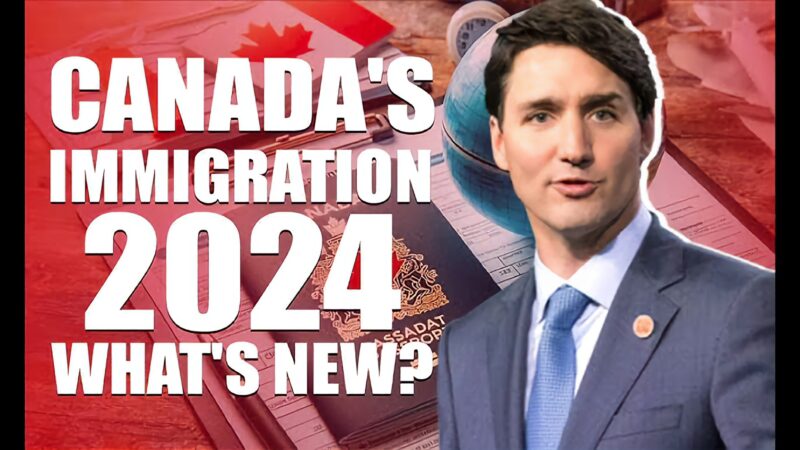Canada to Cut Immigration Targets Amid Housing Crisis and Public Backlash, Trudeau Acknowledges Missteps
In a significant policy shift, Prime Minister Justin Trudeau announced Thursday that Canada will reduce its immigration targets, scaling back the Liberal government’s initial plan to welcome 500,000 new permanent residents annually over the next two years. Trudeau acknowledged that his administration “didn’t get the balance right” in meeting Canada’s labor and population growth needs as the country emerged from the pandemic.
The new targets will lower the 2024 intake to 395,000, with gradual reductions to 380,000 in 2026 and 365,000 in 2027. The decision aims to address mounting criticism over how rapid population growth is exacerbating Canada’s housing affordability crisis.
“Immigration is essential for Canada’s future, but it must be controlled and sustainable,”
Trudeau said, adding that stabilizing population growth will enable federal, provincial, and local governments to improve healthcare, housing, and social services in preparation for future immigration waves.
As Canada’s population rose to 41 million in April—up from 37.5 million in 2019—the issue has stirred intense political debate. Trudeau faces pressure within his own party to avoid a fourth term, with calls for a more cautious approach on immigration policy. On social media, former U.S. President Donald Trump commented, “Even Justin Trudeau wants to close Canada’s borders,” using the announcement to advocate for stricter U.S. border policies.
Tackling Housing and Social Pressures
Immigration Minister Marc Miller supported the new targets, suggesting that reducing immigration could ease Canada’s housing shortage.
“We are an open country, but not everyone can come to this country,” Miller said,
acknowledging changing public sentiment on immigration. He affirmed that the revised numbers remain ambitious but better reflect the country’s capacity to accommodate newcomers.
In his remarks, Trudeau highlighted systemic issues, blaming corporations and educational institutions for exacerbating labor and housing strains. He criticized companies for abusing temporary foreign worker programs and some colleges for enrolling more international students than communities can support.
“Treating foreign workers and students as an expendable source of revenue is unacceptable and needs to change,” Trudeau said.
Political Fallout: Opposition and Internal Challenges
The opposition Conservative Party seized on the policy reversal. Leader Pierre Poilievre accused Trudeau of mismanaging immigration and housing policy, which he argued has dismantled Canada’s bipartisan consensus on immigration.
“He destroyed our immigration system and the national consensus with it,” Poilievre said. “He can’t fix what he broke on immigration and housing or anything else because he’s busy fighting his own caucus.”
This internal dissent among Liberal lawmakers underscores a significant challenge for Trudeau, who affirmed on Thursday that he plans to remain in office through the next election, despite calls from within his party for new leadership.
A Strategic Shift in Immigration Policy
Political analyst Nelson Wiseman, professor emeritus at the University of Toronto, noted that while Canada’s immigration strategy aimed to bolster economic growth and support an aging population, the government underestimated the strain on essential services, which fall under provincial jurisdiction.
“The government’s logic was sound, but Ottawa has limited influence over housing, health, education, and other welfare needs,” Wiseman said. “Lack of coordination with provincial governments was a major oversight.”
Wiseman added that while Canada has historically embraced immigration, public sentiment has shifted due to increased pressure on housing, healthcare, and education. “Ottawa has read the polls and is responding accordingly,” he said.
Key Changes:
Reduced Targets: Permanent resident admissions will decrease from 395,000 in 2025 to 365,000 in 2027.
Focus on Economic Immigrants: The majority (62%) of permanent residents will be economic immigrants.
Priority Occupations: Healthcare occupations, trade occupations, and French-language proficiency will be prioritized.








![National Intelligence Agency DG Resigns From Tinubu’s Government At least 40 dead in Moscow concert hall attack, Ukraine Denies Involvement Rivers Assembly Overrides Fubara, Enacts New Law Breaking: Former Community Youth Leader, Four Others Shut Dead in Egbema, Imo State [VIDEO] Tragic Incident in Enugu: Mother of Three Commits Suicide After Abandoning Children at Police Station BREAKING: Three-storey building collapses as Ebute Metta, Lagos Akwa Ibom pastor Solid Rock Church, Apostle John Okoriko abia uturu student gunmen Asuu suspends strike bonny lga chairman Hon. David Rogers Irimagha Another Kidnapped Victim, Suleiman Sabo rescued by Police In Abuja](https://reportafrique.com/wp-content/uploads/2020/12/report-afrique-breaking-news-260x195.jpg)

Join our Channel...